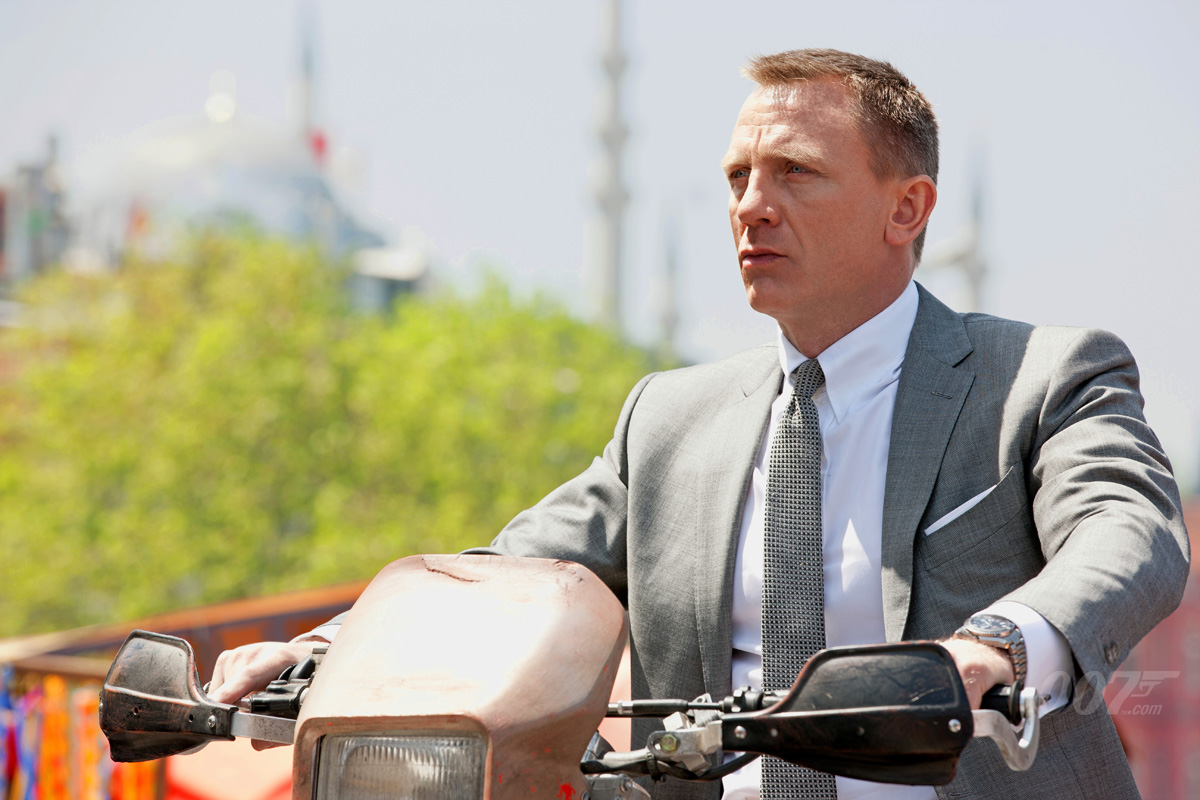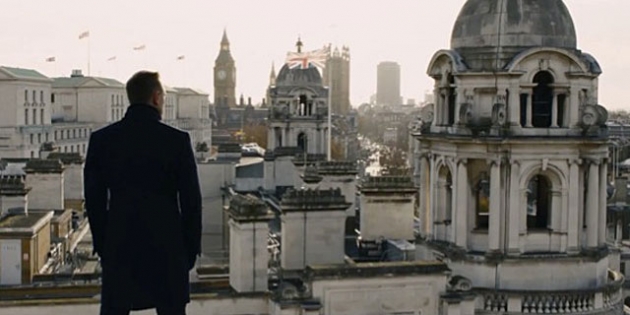|
When
a list of MI6's agents falls into the wrong hands James Bond (Daniel
Craig)
pursues the man who stole it. But during a tense standoff on a train, M
(Judi
Dench) makes the call for a shot to be taken. Bond is accidentally
wounded by
fellow agent Eve (Naomie Harris) and the list vanishes with the man.
With Bond
presumed dead, M takes the fall and is set to be replaced, with the
relevancy
of the 00 agents questioned by the Intelligence Chairman Gareth Mallory
(Ralph
Fiennes). Bond briefly takes to drinking until there is a terrorist
bombing against
MI6. Returning to Britain, Bond remerges, bitter at M, but determined
to
serve his country. Although weakened, Bond vows to get the list by
travelling
globally to places like Shanghai and is given some help by a younger
agent
codenamed 'Q' (Ben Whishaw) and the mysterious Severine (Berenice
Marlohe). He
eventually discovers that his nemesis is Silva (Javier Bardem), a
criminal mind
of the computer age, who has a personal vendetta against M herself.

Some
will argue that in the 50th year of the James Bond franchise Skyfall is the spy's pinnacle adventure,
taking us into a new age of invisible terrorism, far beyond Ian
Fleming's
post-war espionage novels, while also reintroducing staple characters
from the
series and finally teasing at Bond's past. The film's craft alone, at
the hands
of British director Sam Mendes, rates as a series highpoint. However,
true
greatness still remains another entry away. This is the most overtly
political
and conservative Bond film to date, which is jarring for a franchise
that defined
the term "reboot" in mainstream cinema not long ago. This
conservatism harps back to the Bond novels and their fear of the
declining
British Empire. Fleming was a journalist and a naval intelligence
officer. He
prepared intelligence units and modelled Bond on various agents and
commandos
he met. Fleming wrote at least a dozen Bond novels, some of which
criticised
for a lack of ethics, being "sado-masochistic" or adolescent. The
film series rarely grew up either. It's been spoofed, imitated and even
toyed
with self-parody too. The stunts and gadgets grew silly and the puns
were increasingly
lame. What separated this once colourful franchise from production line
blockbusters anymore? The Daniel Craig era looked to rectify this: a
darker
tone, less CGI and Bond projected as a human being. Skyfall
shares this attitude, along with the same visceral nature and
physicality as Casino Royale (2006).
It's an exciting, often funny adventure, but even as it postures
towards a
changing era, it's still Bond. In this half-century of vodka martinis,
little
has changed, and here Skyfall doesn't
follow-up on some enticing threads and possibilities, signposted in the
first
half.

What
can't be faulted however is the photography by Roger Deakins. He frames
this
movie beautifully, with more width than we've ever seen in a Bond film.
It
makes Bond resemble a smaller piece of a much greater spectrum of world
terror.
There are some gorgeous sequences in this film, my favourite being a
martial
arts battle fought in a glass building. The blows are photographed with
dark
shadows, like a silhouette, and the screen is shrouded by a blue filter
lens. Action
sequences like this, selective in a strong, leisurely first half, have
more
weight to them, fused with questions over Bonds fitness and the
relevancy of M
and the 00 agents - clever metaphors for the franchises own relevancy.
Though the
first half is witty and promising, with Dench and Craig's sparring
sessions a
delight, the second portion is bombastic, tense but unsatisfying. The
cracks in
the screenplay coincide with the introduction of Bardem's Silva, whom
the film
gambles heavily on. French actress Berenice Marlohe is thrown by the
wayside; her
character is a mere waypoint leading to Silva. As for Bardem, his
villain in No Country for Old Men (2007) was a case
of less is more. He's been cast to do the same, to be scary, but the
character
is underwritten. His acting style is broader and over the top to
compensate and
it's an unusual concoction of humour and weirdness. At most, his
character
provides an interesting suggestion about M's poor treatment of her
agents.

A
great seed of conflict between Bond and M is planted by this, only to
be
diluted by a number of action set pieces, several of which owe too much
to The Dark Knight (2008). Huge plot holes
become startlingly visible too: If Silva is a wizard in electronic
sabotage and
can place bombs on MI6's doorstep, why does he personally go to such
extraordinary lengths to attack M himself? If he specialises in
cyberterrorism,
and has a sophisticated background, why are his tactics in the final
climax so
lead-heavy? Bond wants to be a serious franchise, it wants to be
Nolan's Batman,
but we're expected to ignore the plot inconsistencies. Bond still
dazzles, but
there's disunity around the direction and future of the series too.
It's
repackaged beautifully, but inside is a political tool, with references
to the
London bombing, shots of the British flag and a main character that is
decidedly
immobile, though not through circumstance. In Casino Royale,
Bond returned to the circus out of personal tragedy
and revenge. Now he's back only because Britain needs him. He's not
ready yet
to be called the spy who came in from the cold.
|